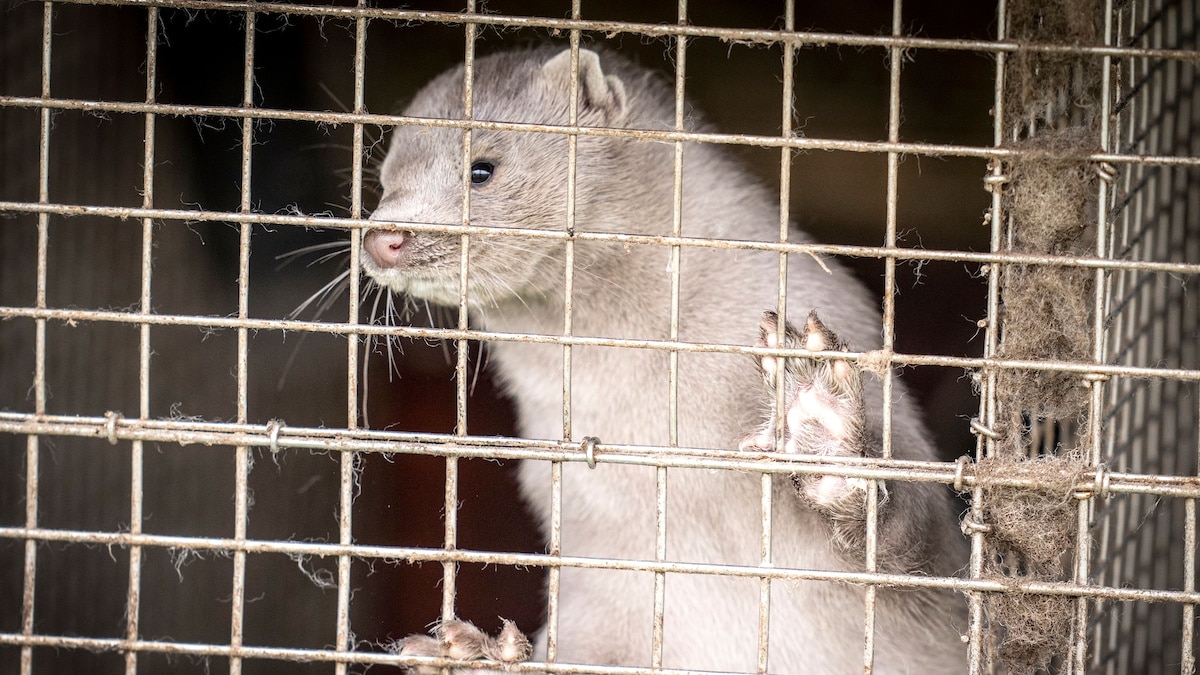
Denmark To Kill up To 17 Million Farmed Mink To Stop Coronavirus Mutation

A mink at a farm in Denmark on Oct. 8, 2020. MADS CLAUS RASMUSSEN / Ritzau Scanpix / AFP via Getty Images
Denmark will kill all of its up to 17 million farmed mink after a mutation of the new coronavirus spread from the animals back to humans, Prime Minister Mette Frederiksen announced Wednesday.
The decision came after authorities found strains in both humans and mink that were less susceptible to antibodies, fueling concern that the new mutation would make any future vaccine less effective, Reuters reported.
“The worst case scenario is a new pandemic, starting all over again out of Denmark,” Kare Molbak, director at the State Serum Institute that conducted the tests, said, as Reuters reported.
The institute, which is the Danish authority in charge of managing infectious diseases, said it had found five antibody-resistant cases of COVID-19 in the mink farms and 12 in humans, according to CNN.
Denmark is the world’s No. 1 producer of mink fur, according to BBC News. It has struggled to prevent the new coronavirus from spreading across its mink farms for several months now. In October, a million mink within five miles of confirmed or suspected infections were culled, according to CNN.
Frederiksen said Wednesday that the decision to cull the entire population was made with a “heavy heart.”
“We have a great responsibility towards our own population, but with the mutation that has now been found, we have an even greater responsibility for the rest of the world as well,” Frederiksen said.
Denmark is not the only place where the new coronavirus has spread to farmed mink and potentially back to humans. A study that has not yet been peer reviewed found evidence that people had contracted the coronavirus from farmed mink in the Netherlands, according to The New York Times. Thousands to hundreds of thousands of mink have been culled in the Netherlands, Spain and Utah because the coronavirus spread to farmed populations, according to BBC News and The New York Times.
More than 50 million mink are raised for the fur trade every year, according to BBC News. Scientists are still researching why the animals catch and spread the new coronavirus, but The New York Times pointed out that they are often kept in crowded conditions that encourage the spread of disease. Once infected, they can become very sick and die.
Since the coronavirus pandemic first emerged, scientists and environmentalists have pointed to the exploitation of nature, including intensive farming, as a major risk factor in the spread of disease.
“Rampant deforestation, uncontrolled expansion of agriculture, intensive farming, mining and infrastructure development, as well as the exploitation of wild species have created a ‘perfect storm’ for the spillover of diseases from wildlife to people,” a group of biodiversity experts wrote in April, as EcoWatch reported.
Animal welfare advocates have responded to the news of Denmark’s mink cull to call for the end of fur farming altogether.
“The right decision would be to end mink farming entirely and help farmers into [another] occupation that does not jeopardize public health and animal welfare,” Animal Protection Denmark told The New York Times.
Humane Society International / Europe’s senior director of public affairs Dr. Joanna Swabe, meanwhile, praised Denmark’s decision.
“Denmark is one of the largest fur producers on the planet, so a total shutdown of all Danish mink fur farms amid spiralling Covid-19 infections is a significant development,” Swabe told The Guardian. “Although not a ban on fur farming, this move signals the end of suffering for millions of animals confined to small wire cages on Danish fur farms solely for the purposes of a trivial fur fashion that no one needs.”
- Macy's Bans Fur, but Is Faux Fur an Environmentally Friendly ...
- Utah Mink Becomes First Wild Animal to Test Positive for Coronavirus - EcoWatch
- Denmark Begins Exhuming Buried Mink

 233k
233k  41k
41k  Subscribe
Subscribe 